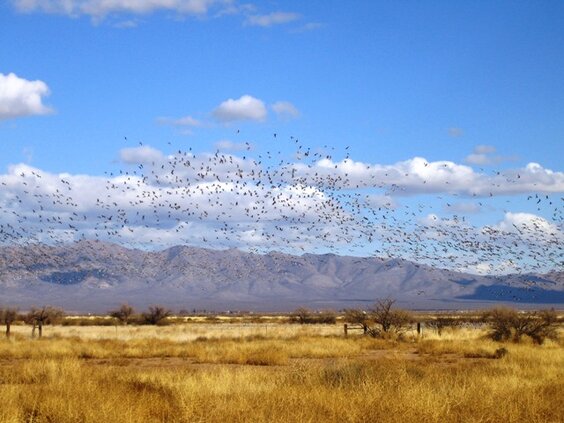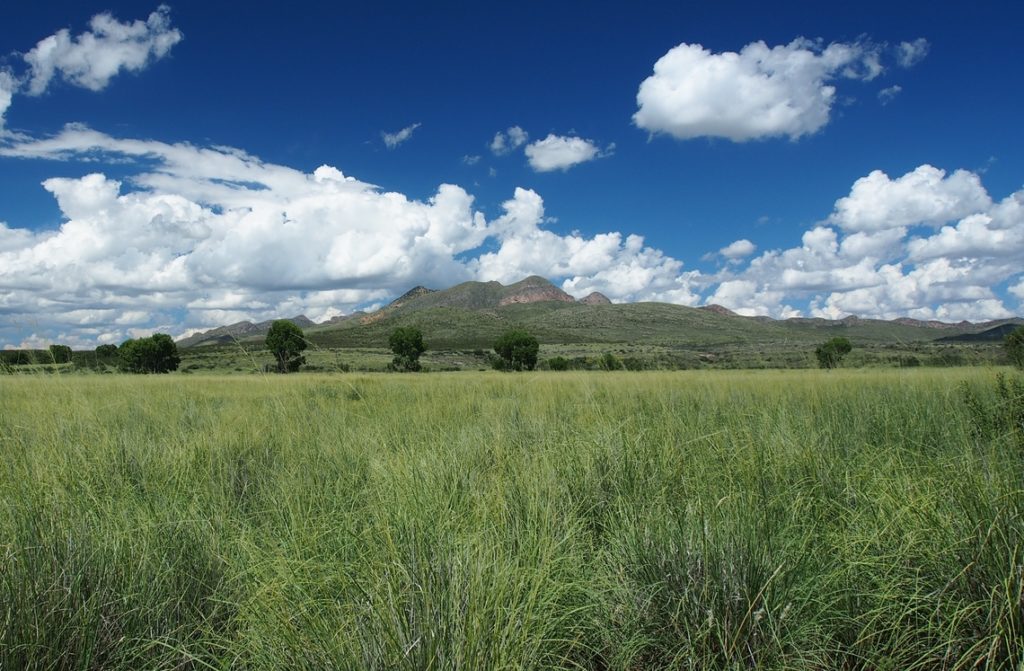
The Trust will conserve nearly 2,000 acres of the Red Wing Ranch in the Sulphur Springs Valley (photo courtesy of ALWT).
By Liz Petterson, Executive Director, Arizona Land and Water Trust
Arizona Land and Water Trust (the Trust) is committed to the protection of Southern Arizona’s western landscapes, its farms and ranches, wildlife habitat, and the waters that sustain them. Founded in 1978, the Trust takes a collaborative approach to conservation, guided by knowledge of local communities, partnerships and science to sustain people and places.
Together with supporters, landowner and funding partners, the Trust has protected more than 58,000 acres of working landscapes in Southern Arizona. The Trust works with willing landowners and organizations to protect natural resources through donated or purchased conservation easements, among other conservation tools. Each easement is a voluntary restriction on future non-agricultural development tailored to meet the landowners’ needs and maintain conservation values of the property. Today, the Trust holds nearly 21,000 acres of conservation easements throughout Southern Arizona.
In the past year alone, the Trust permanently protected over 5,000 acres of working landscapes and wildlife habitat. Most recently, the Trust closed on a project, in partnership with landowners, to conserve nearly 2,000 acres of the Red Wing Ranch in the Sulphur Springs Valley. Protection of the ranch ensures habitat for many species documented in the area, including the lesser long-nosed bat, jaguar, ocelot, Chiricahua leopard frog and the Yellow-Billed Cuckoo. The nearby seasonally flowing streams and wetlands, including the Willcox Playa to the east and the Whitewater Draw to the south, provide essential corridors for wildlife and a wide variety of waterfowl, including Mexican Duck and Sandhill Crane.
Tombstone Ranch, also in the Sulphur Springs Valley, was protected earlier this year. The Trust has now protected nearly 5,000 acres of the Whitewater Draw, including a 4-mile reach of the watercourse that provides vital habitat for Mallard, Northern Pintail, Gadwall, Wilson’s Snipe, various teal species, as well as nesting habitat for Mexican Duck. A conservation easement on Tombstone Ranch prevents additional groundwater pumping on the property, helping to protect the 1,528-acre Whitewater Draw Wildlife Area, which provides winter habitat for migrating Sandhill Cranes.
The Trust also recently had the opportunity to partner with the owners of Babacomari Ranch to protect 2,488 acres of the historic cattle ranch in Santa Cruz County. The project was completed in January 2020 and helps sustain the family’s rich historical and cultural legacy, preserves habitat for wildlife and ensures the land will remain a working landscape for generations to come. The property includes rare Cienega wetlands and miles of cottonwood-lined riparian ecosystems along the Babocomari Creek, a tributary of the San Pedro River.
Partnering with the Bureau of Land Management, the Trust also protected 477 acres of the Hayhook Ranch in the Coyote Mountains Wilderness Area. This conservation project protects important wilderness, cultural and spiritual values, and improves public access to the 5,080-acre Coyote Mountains Wilderness Area located approximately 40 miles southwest of Tucson. This region is recognized for its stunning views of the surrounding valley and diverse plant species. It also provides habitat for a number of species including the lesser long-nosed bat and Cactus Ferruginous Pygmy Owl.
Currently, the Trust is working to preserve vital landscapes in Santa Cruz Valley, expanding upon 2,500 acres already purchased and held by the Trust, as well as 4,100 acres protected by Pima County in 2009. The property contains some of the area’s most significant habitat of the Western Yellow-billed Cuckoo, a threatened species under the Endangered Species Act. Western Yellow-billed Cuckoos were once a common sight along Arizona’s rivers but are currently threatened in the state due to the poor health of our river systems. The species requires large blocks of riparian habitat for nesting.
You can learn more about the Trust’s projects through their Virtual Happy Hours. Each month, guest speakers — ranging from landowner and funding partners to climate change experts — provide informative discussions on critical regional topics via Zoom. These events are free to attend. You can watch recordings of past happy hours and sign up to receive invitations here.
For more information about the Trust, you can visit our website, call 520-577-8564, or email Liz Petterson directly.


 English
English  Español
Español 
